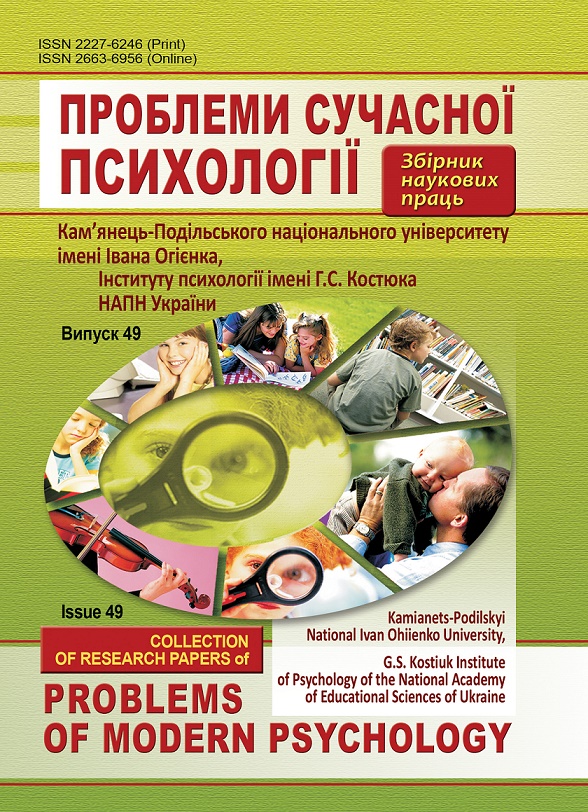The Relationship of Professional Burnout of the Teachers with the Peculiarities of the Value-Sense Sphere and Life Position
DOI:
https://doi.org/10.32626/2227-6246.2020-49.296-321Keywords:
professional burnout, emotional exhaustion, value-sense orientations, professional success.Abstract
The aim of the article is to consider the theoretical and practical approaches in the study of professional and emotional burnout of the teachers in the context of the interrelation of their value-sense sphere and existential sensation. The concepts of «professional and emotional burnout» are analyzed from modern points of view, but they are based on the known theories of H. Maslach and N. Vodopianova. It is noted that burnout in the broadest context, as a state of psycho-emotional and motivational exhaustion, is caused by the imbalance of expenditures and resources of professional activity, which affects the value- motivational basis of the regulation of behavior and leads to a long-term decrease in human efficiency in his or her vital sphere of life.
In order to determine the relationship between expressiveness of professional burnout and peculiarities of value-sense orientations, a complex of methods and techniques has been used, such as standardized questionnaire «Professional burnout» (by N. Vodopianova and O. Starchenkova), Questionnaire of Life Orientations (by O. Korzhova), the Schwartz’ Theory, the Existence Scale (by A. Längle, K. Orgler), Subjective Alienation Questionnaire (by S. Maddi, in the adaptation of Ye. Osin), Maddi’s Vitality Test, the Coping Test (by R. Lazarus and S. Folkman), methods of correlation and factor analysis.
The results of the research. It was determined that the acceptance and denial of a number of educators’ values were significantly related to the symptoms of burnout – they can be their diagnostic markers, causes or effects. In general, burnout of teachers is accompanied by the desire for inner harmony, the attitude to health and safety as the leading principles of life, the strengthening of hedonistic attitudes, the desire for novelty.
The correlation analysis has been conducted, which established that the existential fullness of life directly correlated with the level of personal and professional achievements of teachers and was a factor that counteracted burnout. The expressiveness of burnout, on the contrary, correlates with manifestations of self-alienation and loss of sensation in different areas of life.
In conclusions, it was proved that there are common strategies of life, which regulate the relationships of professional burnout and value-sense orientations of employees and heads of secondary schools, such as exhaustion by self-improvement; hyperhedonism; freedom of thoughts and actions; humanistic position; correspondence to social expectations.
References
Бессонова Ю. В., Лазебная Е. О. Ценностные предпосылки выгорания субъекта труда. Выгорание и профессионализация: сб. науч. тру¬дов / под ред. В. В. Лукьянова и др. Курск : КГУ, 2013. С. 29–43.
Бондарчук О. І. Соціально-психологічні основи особистісного розвитку керівників загальноосвітніх навчальних закладів у професійній діяльності: автореф. дис. … д-ра психол. наук: 19.00.05. Київ, 2008. 34 с.
Водопьянова Н. Е., Старченкова Е. С., Наследов А. Д. Стандартизиро¬ванный опросник «Профессиональное выгорание» для специалистов социономических профессий. Вестник Санкт-Петербургско¬го университета. Серия 12. Социология. 2013. Вып. 4. С. 17–27.
Гончаренко Н. В., Білоус М. В. Психологічні особливості прояву синдрому «емоційного вигорання» у провізорів-інтернів. Проблеми су¬часної психології: Збірник наукових праць Кам’янець-Подільсько¬го національного університету імені Івана Огієнка, Інституту психології імені Г. С. Костюка НАПН України / за наук. ред. С. Д. Максименка, Л. А. Онуфрієвої. Кам’янець-Подільський : Аксіома, 2018. Вип. 40. С. 62–80. DOI 10.32626/2227-6246.2018- 40.62-80.
Карамушка Л. М., Гнускіна Г. В. Психологія професійного вигорання підприємців: монографія. Київ : Логос, 2018. 198 c.
Левит Л. З. Психология развития и реализации жизненного потенциала субъекта: дис. … д-ра психол. наук: 19.00.01. Киев, 2016. 605 с.
Лэнгле А. Эмоциональное выгорание с позиций экзистенциального ана¬лиза. Вопросы психологии. 2008. № 2. С. 3–16.
Фесун Г., Нечитайло Т., Канівець Т. Взаємозв’язок компонентів синдро¬му «професійного вигорання» з особливостями сімейного статусу в педагогів. Психологічні перспективи. 2019. Вип. 34. С. 232–248. URL : https://doi.org/10.29038/2227-1376-2019-34-232-248.
Freudenberger, H. (1974). Staff Burnout. Journal of Social Issues, 30, 159–165. DOI 10.1111/j.1540-4560.1974.tb00706.x.
Maslach, C. (1976). Burned-out. Human Behavior, 9, 16–22.
Maslach, C., Jackson, S. E., & Leiter, M. P. (1997). The Maslach burnout inventory Manual. Evaluating stress, (pp. 191–218). Palo Alto, California : Consulting Psychologists Press. 34 р.
Maslach, C., & Leiter, M. P. (2016). Burnout. In G. Fink (Ed.). Handbook of Stress: Vol. 1. Stress: Concepts, Cognition, Emotion, and Behavior, (pp. 351–357. Academic Press. DOI 10.1016/B978-0-12-800951- 2.00044-3.
Downloads
Published
How to Cite
Issue
Section
License
Copyright
The Editorial Board has the full right to publish original scientific papers containing results of theoretical and experimental research works which are not currently subject to review for publication in other scientific editions. The Author shall transfer to the editorial board of the Collection the right to spread the electronic version of the paper, as well as the electronic version of the paper translated into English (for papers originally submitted in Ukrainian and Russian) by all kinds of electronic means (placement at the official website of the Collection, electronic databases, repositories etc).
The Author of an article reserves the right to use materials of the paper, without approval with the editorial board and the founders of this Collection: a) partially or fully, for educational purposes; b) for writing own dissertation papers; c) for preparation of abstracts, conference reports and presentations.
The Author of an article can place electronic copies of the paper (including the final electronic version downloaded from the official website of the Collection) at:
- personal web resources of all Authors (websites, webpages, blogs etc.);
- web resources of the institutions where the Authors are employed (including electronic institutional repositories);
- non-profit public access web resources (for example, arXiv.org).
But in all cases, it is obligatory to have a bibliographic reference to the paper, or a hyperlink to its electronic copy placed at the official website of this Collection.






